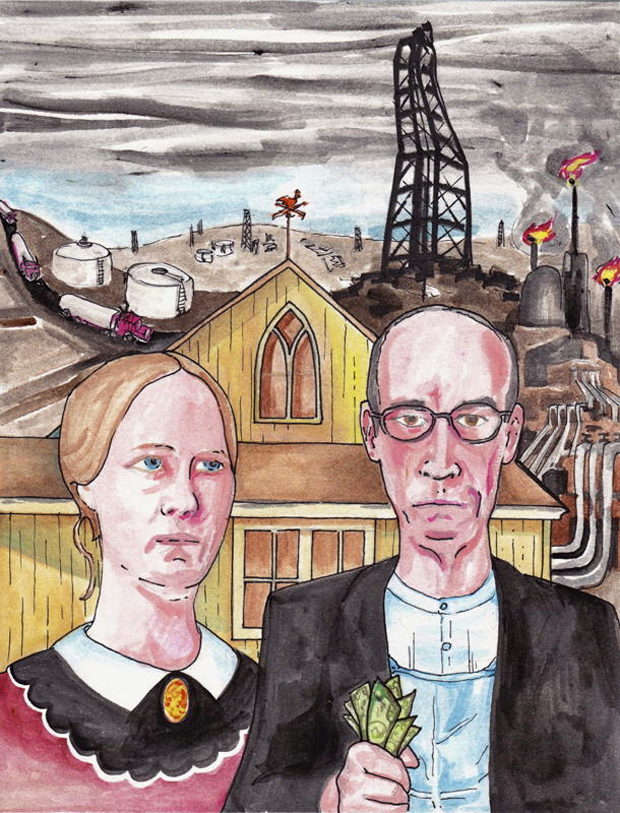Farmers hope to cash in on fracking phenomenon


Working the land is a difficult living. Rising costs and the encroachment of suburbs has led many farmers to seek out non-traditional sources of income. Leasing land to gas companies for hydro-fracking has become a potential lifeline for some.
Farmers who are in favor of fracking are facing opposition from environmental groups and sometimes even neighboring farms that might want to see the practiced banned. Some organic farmers are concerned with potential contamination from fracking activities that could threaten their livelihood by tainting their land.
As the debate continues, as much as 60 percent of land in one New York country has already been leased out. The Marcellus and Utica shale formations that are located upstate are thought to hold vast reserves of natural gas, and natural gas development is expanding.
The Epoch Times's Tara MacIsaac recently wrote about how the fracking controversy is unfolding in upstate New York. She told the tragic story of one farmer in Cortland County who leased out his land for $500,000 only to face financial ruin after incurring major investment losses in 2008. The drilling money was more than he thought he'd ever see from a life of farming.
That wasn't necessarily a cautionary tale, because the farmer could have invested his money differently. The article examined how a few farmers have become millionaires in best-case scenarios; others signed up quickly and receive only a small share of the overall royalties. Cornell researchers did, however, note that many leases are being obtained on the cheap, according to the article.
Drilling on farmland isn't even always avoidable. A farmer whose neighbor leases out adjacent property could be compelled into either paying into the venture as an active partner, be loaned money by the gas company and hope for payback, or simply sit back and collect the royalties (themselves or through an LLC). Drilling operations can be set up in their most productive fields, and they cannot dispute that, Epoch reported.
That's assuming that the well produces and is profitable on the books. My colleague Chris Nelder wrote about the questionable economics of shale gas drilling, and concluded that there is no guarantee that all operations will make money. There's no telling what the gas will sell for, how economically it can be produced, and the nation's reserves may be dramatically overstated.
Opponents say that there are too many unknowns that could threaten the future of the food industry in upstate New York. They point to the potential risks of the chemicals that are used in fracking and highlight its disputed safety record. Any contamination could turn customers off of New York produce or threaten farms that are certified organic, they say.
Their worries are being confirmed by mounting supportive evidence. A Cornell University professor recently concluded that shale gas mining activities were sickening animals and some people throughout the United States. The Environmental Protection Agency uncovered a toxic brew that fouled an aquifer at one site in Wyoming, and hydrofracking companies admitted to pumping diesel fuel into the ground during the Bush years. Researchers at Duke University have also accused the industry of stonewalling with contamination data.
Of course, many farms might shut down anyway. I've witnessed them disappearing throughout my lifetime. My childhood memories of the Bucks County, PA, landscape is of a very different place than it appears today. I can tell you where the farms used to be. The farms were gradually replaced by housing developments, and those few that remained have either received government aid to preserve "open space" or hustle to find new revenue with haunted hayrides and apple picking.
Farmers in upstate New York have a right to make money off of their land, which they presumably want to hold onto and pass on to future generations. The question is, who is going to make out best on the arrangement - the farmers or the gas companies, and will future generations be able to enjoy the fruit of their labor?
Photo: “American Gasland,” artwork by River Side (marcellusprotest/Flickr)
Related on SmartPlanet:
- EPA: hydrofracking may have tainted Wyoming groundwater
- Ohio: frackers caused earthquakes
- Fracking triggered British earthquakes
- Toxic fracking fluids revealed in Congressional report
- There’s no fracking way polluters won’t be bad actors
- Hydro-frackers to EPA: We used diesel - tough
- Controversial mining practice may return to the Empire state
- Scientist: gas industry is withholding hydro-fracking contamination data
- Marcellus shale fail - estimates of natural gas reserves were overstated
- Hydro-frackers to EPA - ‘tough, we used diesel’
- Everything you know about shale gas is wrong
- The questionable economics of shale gas
- study: hydrofracking sickening animals, people
- Marcellus shale fail: estimates of natural gas were inflated
This post was originally published on Smartplanet.com